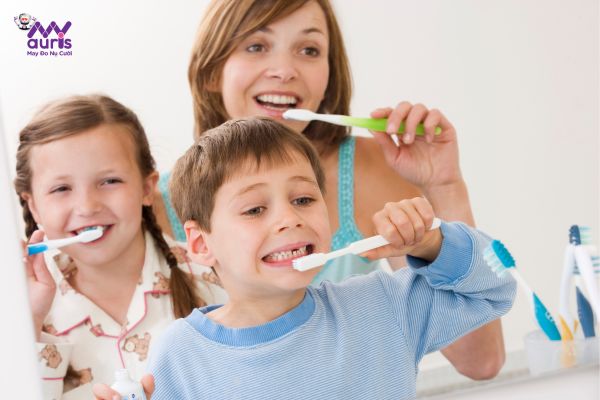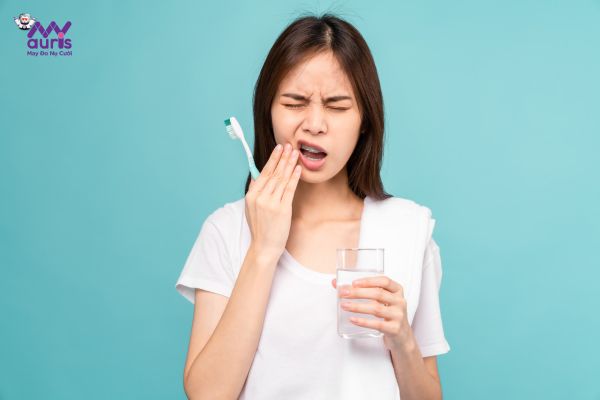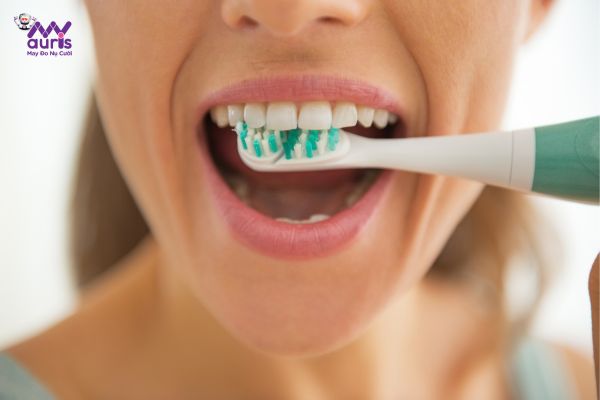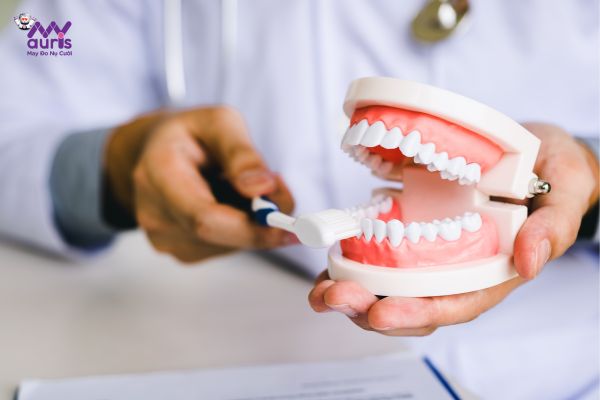Brushing teeth is one of the daily oral care habits to remove food particles, plaque and bacteria that are harmful to oral health. Brushing teeth properly and regularly every day helps protect and improve oral health. So how many times a day should you brush your teeth and is brushing your teeth a lot good? To answer your questions, let’s find out with My Auris through the following article.
How many times a day should you brush your teeth?
Brushing teeth is an oral care habit and must be done regularly every day. So how many times a day should you brush your teeth? According to doctors, how many times a day you should brush your teeth depends on your age:
Children from 6 months – 2 years old
Children from 6 months, the baby teething stage has begun but their gums are still soft and vulnerable, not able to be affected with a toothbrush like adults. Therefore, parents should choose appropriate teeth cleaning tools and methods for their children.
Many people believe that children only drink milk and eat powder, so they do not need to clean their teeth. However, this is a wrong view because it causes plaque to accumulate and creates conditions for bacteria to cause tooth decay and bad breath.
At this stage, mothers should use a thin, absorbent towel to clean their children’s teeth and tongue. Movements should be done gently and can be done many times a day.
Children aged 3-13 years old
At this time, the baby teeth are relatively complete and the child’s gums have also become stronger. Therefore, parents should choose age-appropriate toothbrushes for children to brush their teeth every day. According to dental experts, children from 3 to 13 years old should brush their teeth twice a day, when they wake up in the morning and before going to bed at night.

Children aged 14 and older
At this time, baby teeth have been replaced by permanent teeth, so you need to pay attention to thorough brushing and oral hygiene. Because permanent teeth, once lost, cannot be replaced like previous baby teeth.
According to expert recommendations, adults should brush their teeth 2-3 times a day, in the morning when they wake up, in the evening before going to bed and after lunch.
In addition, besides brushing teeth, adults also need to combine the use of dental floss, salt water, mouthwash or water flosser to increase teeth cleaning effectiveness.mouth, disinfects and removes plaque and food debris.

Consequences of brushing your teeth too much and too much less
According to dental experts’ recommendations, adults brush their teeth 2-3 times a day. However, if you brush less or more than this number of times, it will not be good but will also be harmful to your oral health.
Brushing too little
Even though brushing teeth is recommended as a daily oral care habit, many people still do not comply and brush their teeth less than 2-3 times a day, or even not brush their teeth at all. This greatly affects oral health:
- Yellow and dull teeth: when brushing is not enough, plaque and food accumulate and remain on the crown of the teeth. Over time, they become calcified, forming hard tartar that is difficult to remove and increases the risk of dull, yellow teeth. At the same time, tartar also increases the risk of developing oral diseases.
- Causes bad breath: plaque and food debris that accumulate over time also create an ideal environment for bacteria to multiply and develop. This bacteria decomposes leftover food in the oral cavity and produces acid with an unpleasant odor.
- Causes permanent tooth loss: tartar that sticks too much on teeth without being cleaned also causes an increase in dangerous diseases such as tooth decay, periodontitis, gingivitis, tooth abscess, etc. These diseases progress, increasing inflammation and even tooth loss.

Brushing your teeth too much
Contrary to those who brush their teeth less, there are many people who believe that brushing their teeth more is better for their health. oral health and increased cleaning efficiency. However, brushing your teeth more than the prescribed number of times will greatly affect your oral health such as:
- Eroses tooth enamel: plaque, bacteriai is the only cause of tooth enamel erosion. Brushing too hard can also wear away tooth enamel, making teeth sensitive, susceptible to pain and yellowing.
- Causes gingivitis: toothbrushes can damage gums by brushing too hard and too many times. Gingivitis is a common oral disease, causing symptoms such as bleeding, bad breath, redness and swelling and even tooth loss.
- Gingival recession: gum recession is a case where the gums are pulled away from the tooth roots, causing the tooth roots to be exposed, causing the teeth to become sensitive and prone to tooth loss.

How long should you brush your teeth each time?
If you brush your teeth too quickly, it will not remove plaque and food particles from your teeth, and will also harm tooth enamel and affect soft tissues. Therefore, dental experts recommend brushing your teeth for about 2-3 minutes every time. Some special people need to spend time brushing their teeth properly, like children just learning to brush their teeth. At this time, parents need to guide and watch their children’s actions, which may last more than 3-5 minutes per brushing session.
Brush your teeth with a regular toothbrush
- Incline the brush at a 45-degree angle to the gums
- Move the brush back and forth briefly and gently
- Brush both the inside and outside to remove bacteria and plaque. Brush your teeth in an up and down motion, avoid brushing your teeth horizontally.
- Rub and clean your tongue to increase the effectiveness of cleaning bacteria.

Brush your teeth withelectric toothbrush
Some people who use an electric toothbrush should place the toothbrush at a 45-degree angle to the gums. Then, move the brush gently between the teeth and both the inside and outside surfaces.
Finally, clean and scrub your tongue with a tongue scraper or regular brush.
In addition, to increase antibacterial effectiveness and remove plaque and food debris, people should use a combination of dental floss, salt water and specialized mouthwash. Can be used after eating to avoid brushing teeth too many times.
Hopefully the information in the article abouthow many times a day you should brush your teeth will help people answer their questions. From there, know how to care for and clean your teeth to prolong the life of your teeth. At the same time, people still have to have regular dental check-ups to check and monitor their oral health. Please contact My Auris Dental immediately for advice and to schedule an examination as soon as possible.
Anh Thy





